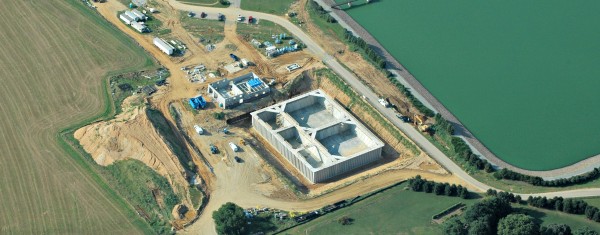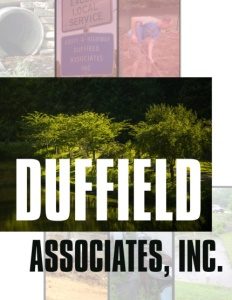Business View Magazine interviews Guy Marcozzi, President & CEO of Duffield Associates, Inc., as part of our focus on Sustainable ‘Green’ Best Practices.
Duffield Associates is a growing service provider of geoscience technology. Established in 1976, this award-winning engineering firm has aggressively implemented energy saving, water conservation, and sustainable practices throughout its offices and facilities. From constructing a new green building, to a pioneering recycling program, to geothermal climate control, to adaptive reuse, “living green” is a full-time priority for the company’s talented and dedicated team of professionals.
Guy Marcozzi, President and CEO of Duffield Associates, elaborates on this impressive consulting firm and its laudable ‘green’ initiatives. “Geotechnical engineering is a relatively new profession only formally practiced since the 1930s,” he says. “By the ‘70s, it was still kind of a ‘black box science’ where structural engineers just wanted to know the design parameters, but it wasn’t really understood what they actually meant. Everybody assumes that the ground should be able to support anything – until it doesn’t.”
Into that world stepped Jim Duffield, the company’s namesake. He was practicing for a large, local architect-engineer firm that wasn’t developing soils as a key area of the business. So, in 1976, Jim stepped out and formed a one-man geotechnical engineering firm. He understood that soils work with structure; an interplay of sciences that is the essence of effective design. Today, this interplay remains the foundation of Duffield Associates.
“A design with soil is inherently uncertain, unlike concrete or steel that is very precise,” says Marcozzi. “We were providing input for various foundations, and realized that in specialty situations, the structural engineers were adding additional factors of safety onto the soil factors, and clients were getting overly conservative designs. Being able to do construction and inspection services, and verify your assumptions is critical. Therefore, we added specialty structural services into our repertoire.”
Implementation of the Clean Water Act in the mid-80s propagated a slew of regulations related to natural resources. Duffield Associates was an early identifier of these opportunities because wetland science involves soil structure. It added those types of services, which led to permitting services, and ultimately water resource services including flood control, groundwater extraction, stormwater management, and land development civil engineering.
The company employs approximately 110 people, and covers the mid-Atlantic region with offices in all three counties of Delaware. Home turf is northern Virginia to eastern Pennsylvania, eastern Maryland and southern New Jersey, with eight offices spread around that area. Marcozzi notes, “Southern Delaware is more agrarian, so there we support the poultry industry with waste treatment and things of that nature. Shoreline and inland bays in southern Delaware have us working with State and Federal agencies on beach replenishment or nutrient management. In northern Delaware, we focus on the energy industry, ports along the river, refineries, industrial businesses, and large commercial operations.”
The central Pennsylvania office specializes in landfills, supports the Department of Transportation on issues with bridges, and works with the powerful warehousing and distribution market. In Philadelphia, work is tied to urban stormwater management strategies like green roofs. Marcozzi says, “The City of Philadelphia is a big client, and because we work with them so much, we understand the rules and that drives our private sector work with urban stormwater management and civil design. We try to keep a nice mix of one third government, one third industry, and one third private development, but those percentages fluctuate based on the economy.”
Duffield Associates offers a broad array of services, yet it’s still a relatively small firm, with a team culture designed to aggregate people across disciplines and incubate collaboration on a personal level. According to Marcozzi, “A lot of smaller firms are less diverse than we are and struggle with today’s complex regulatory environment. It requires a broad understanding of environmental remediation, zoning codes, variances, geotechnical design, wetlands – all the pieces we can fit under one roof – with a team that knows each other and works together. It gives us a competitive edge over smaller firms that subcontract services. Large firms struggle to collaborate because they’re not all in the same office, and many times don’t know each other on a personal level.”
The company has made three small acquisitions, one in each of the last three years, and is now working to integrate them while looking for more “bite-size” acquisitions to fit its strategy. Surprisingly, bidding on contracts is not the norm. In professional services, most of the public work is qualifications-based selection. In the private sector, it’s usually relationship based; the industrial sector is a hybrid of those two. However, all clients pay attention to costs, and Duffield Associates is not immune, usually competing directly against one or more firms.
Marcozzi speaks candidly about the future: “We’re a small firm with a diverse ownership group that is dependent on evolving ownership transition. The new Millennials don’t have the same mindset that the Baby Boom generation had, so we need to bridge that gap and have an active succession plan for transfer of ownership. Today, one of my largest challenges as the CEO is how to acquire these folks, integrate them, keep them loyal, and demonstrate to them that being part of an ownership team is in their best long-term interest. We’re actively working in urban markets like Philadelphia and Baltimore because that’s where our young staff wants to live.”
Climate change is also a real concern, especially in low-lying Delaware, southern New Jersey, and eastern Maryland. Marcozzi explains, “Delaware issued a directive that all public projects must consider the effects of sea level rise over the next 100 years. The challenge is there’s not full consensus on what that means. We’re all battling against tight budgets, and when you have discussions about sea level rise – particularly with ports, or beach replenishment, or inland bays that are directly affected – it’s very expensive. There’s an interest in doing the right thing and being proactive, but also the reality of determining how to pay for it. Sometimes it can double or triple the cost of a project. It forces a level of pragmatism, even within state agencies. In a region where half the state would be significantly impacted by a large storm event in a one meter sea level rise situation, it’s an important issue.”
Recognizing its greatest resource is people, Duffield Associates fosters relationships in university communities to attract the best and brightest students, and considers the schools a vital supply chain partner. It also relies on environmental testing laboratories for environmental analytical work, works closely with a survey partner and specialty consultants, and long-term service partners in accounting and insurance. As business advisers, those insurance groups help Duffield break into different markets, so they are somewhat synergistic.
Marcozzi admits, “Our partners and staff are committed to the business of solving problems for our clients and, as CEO, it pains me to say that it sometimes takes precedence over financial aspects. We need to make enough money to stay in business, but we don’t want the cookie cutter stuff. We enjoy the challenge of projects that are complicated. We want to look at it differently and develop creative solutions that add real value for clients.”
“Our founder, Jim Duffield, was fond of saying, ‘We should be looking for ways to save our fee.’ He believed that design is a relatively small part of the entire project cost, and it’s not difficult for us to bring an idea to the table that’s going to save the client money on construction or operation that’s more than what they pay us for our services. That’s a great aspiration that we can’t always deliver, but we do think about it a lot and hit the goal more often than we realize.
“Sustainability and environmental concerns are our passions. Many of us are from the generation where we learned conservation in school and we joke that we were green before it was cool. We were the nerdy conservationists. We have 19 LEED APs (Accredited Professional), which is a lot for a firm our size, and we try to work sustainable practices into our projects. For example, in the maritime industry, some of the cranes operating at the ports have a fair amount of emissions. We have a client facing that issue as they are in a non-attainment zone, which means they can’t contribute any more emissions. So, we came up with a separate, cleaner powering system for the other energy source at the port that would offset the new emissions.
“We also have a township client that wants to restore an old mill in disrepair because it has historical and community significance. We came up with the idea, ‘It’s a mill that used to turn a turbine. Let’s drop a turbine in there and generate some power. And let’s use the power to set up an annual maintenance fund for it.’ The town’s pretty excited about the idea, and we’re looking for grants to fund this as a pilot project because old mills are pretty common in the area, and they could be saved by just reinvigorating old water power.”
Looking at things differently and green… the fuel that powers Duffield Associates to succeed.
AT A GLANCE
WHO: Duffield Associates, Inc
WHAT: Engineering & science consulting firm specializing in civil, environmental, and geotechnical engineering; construction review and testing services
WHERE: Corporate headquarters in Wilmington, Delaware
WEBSITE: www.duffnet.com




